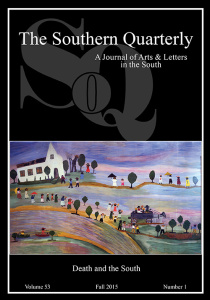Special Issue of SOUTHERN QUARTERLY on
THE U.S. SOUTH AND THE CARIBBEAN
Guest Editor, John Wharton Lowe
Since the earliest days of the contact era, the CircumCaribbean has been the arena for multi-cultural contact and conflict. As the Spanish, English, French, and Dutch competed for new territories and trade routes, Native Americans of the basin were enslaved, infected with disease, and in many cases, exterminated. Early explorers such as De Soto and Ponce de Leon ranged widely through the islands and coastal rims; later, naturalists such as the Bartrams and Humboldt, mapped the region, noticed the affinities between flora and fauna, and saw the sea not as a barrier but a connector; the waters of the basin were increasingly criss-crossed with traders and pirates, as the riches of the new world were shipped to imperial centers in Europe; the mineral wealth was mined by captive Indians, many of whom succumbed to harsh labor regimes and imported diseases. The raw commodities of the CircumCaribbean were produced by millions of enslaved Africans, who brought important knowledge of agricultural production and rich African folkcultures to the islands and coastal rims. Sugar, cotton, coffee, rice, and indigo production brought incredible wealth to planters and created an intricate and cruelly structured plantation economy. As new states were created in the continental United States, ties between them and the Caribbean expanded exponentially, particularly with the advent of steam-driven vessels. French Louisiana and Spanish Florida were closer to cousin cultures in the Caribbean than to those of the adjacent English speaking colonies. Eventually, Louisiana came under Spanish domination and worked within the webbed circuits between Vera Cruz, Havana, and New Orleans.
The Haitian Revolution’s exiles brought new French and African impulses to New Orleans, while the Mexican American war introduced thousands of combat troops drawn from the U.S. South to the Native and Latino culture of Mexico. The addition of new states – most prominently Texas – to the U.S. created an expanded sense of the “South,” a regional concept that took on heft and new meaning as the nation began to grapple with the curse of slavery. Filibuster expeditions, usually departing from Gulf cities such as New Orleans and Mobile, sought to conquer islands and lands South of the South. Cuba in particular was coveted for both its fabled fertility and the prospect of adding it to the Southern contingent of slave-owning states, thereby adding senators and congressmen who could buttress slave economies in Congress.
In the early nineteenth century, and especially after the Civil War and Reconstruction, advances in technology created new business and political ties across national boundaries; the new tourist industry rapidly transformed economies of the islands and coastal rims, while enforced mono-crop agricultural played havoc with traditional patterns of CircumCaribbean rural life. CircumCaribbean writers such as Lorenzo de Zavala, José Teurbe Tolon, and José Martí, often spent time in the U.S., and drew on those experiences in their work. Writers of the nineteenth and twentieth century U.S. South, such as Martin Delany, Constance Fenimore Woolson, Lafcadio Hearn, Katherine Anne Porter, William Faulkner, Zora Neale Hurston, Andrew Lytle, and Evelyn Scott created tales that intersected with more Southern cultures.
Revolutions in Mexico and Cuba spawned radical shifts in relations between the U.S. South and the wider Caribbean, and eventuated in the creation of a new Cuban domain in South Florida, the embargo against Castro’s regime, and the shifting of resources from Cuba to Florida and Puerto Rico. All of these periods and events generated fascinating narratives, both fictional and non-fictional. Many of the texts written in languages other than English have now been translated, enabling us to rethink the CircumCaribbean as a multi-nation construct that annuls national boundaries. As such, we need to reconfigure our notions of U.S. Southern history, the supposed isolation of island cultures, and the antiquated notion of a Confederacy-defined U.S. South.
Possible topics* include but are not limited to:
• Ties between French North America and the CircumCaribbean
• Ties between Spanish North America and the CircumCaribbean
• Foodways of the CircumCaribbean
• CircumCaribbean musical traditions
• African Religions of the U.S. South and the CircumCaribbean
• Southern reactions to the Haitian Revolution
• Haitian migration to Louisiana
• Native diasporas of the CircumCaribbean
• The African diaspora in CircumCaribbean context
• Plantation cultures and economies of the Americas
• Agricultural traditions of the CircumCaribbean (actual) and as reflected in literature
• Material cultures of the CircumCaribbean
• New studies of the U.S. South as part of the CircumCaribbean
• U.S. Southern writers and the Caribbean; Caribbean writers and the U.S. South
• Critical theory and CircumCaribbean literature
• Postcolonial approaches to CircumCaribbean cultures and history
• Asian immigration to the Caribbean
• Cuban American writers of the U.S. South
• Haitian American writers of the U.S. South
• Ecological implications of CircumCaribbean Studies
• The CircumCaribbean and public hygiene; disease; medical histories
• CircumCaribbean photography; journals; letters
*the term CircumCaribbean includes the coastal U.S. South, Caribbean islands, Eastern Mexico, Central America, and the north coast of South America.
Interested authors should send a 500-word chapter proposal to jwlowe@uga.edu by December 1st, 2016. Please note that the accepted abstract does not guarantee inclusion in the volume, which will also consider the quality of the finished chapter.
>via: https://repeatingislands.com/2016/10/27/cfp-the-us-south-and-the-caribbean/

